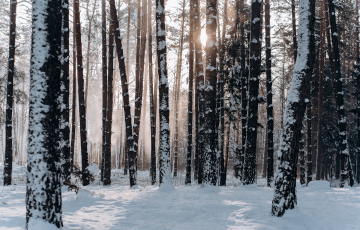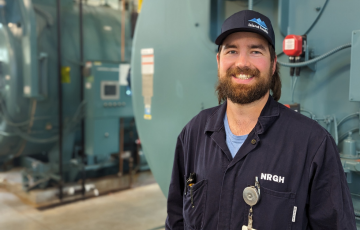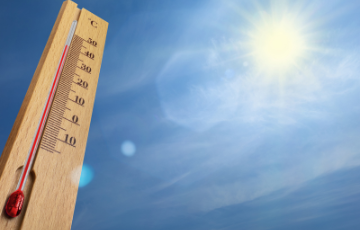Climate change is expected to increase the frequency of wildfires and wildfire smoke in British Columbia. The following information is provided to help you reduce your personal health risk.
Find current air quality warnings on the Health Alerts page.
- Air quality
-
Island Health works with the Ministry of Environment to monitor air quality changes due to wildfires in the region. For the most up to date conditions and air quality warnings, please visit BC air quality warnings and the Air Quality Health Index (AQHI). For information about wildfire weather and smoke forecasts, please visit FireSmoke Canada.
In addition, the Air Quality Map can provide local, timely information on changing air quality. The map, created by the University of Northern British Columbia and Environment and Climate Change Canada, provides information on AQHI and actions you can take. Check out a sensor near you.
Air Quality Health Index
Learn about local air quality ratings, people most at risk, signs of smoke exposure, and how to reduce your exposure: How to protect yourself from smoke this summer.
- Be fire smart and fire safe
-
- Follow the FireSmart program to help protect your property and area from wildfires.
- Visit Coastal Fire Centre bans and restrictions to check on fire bans and restrictions in your area before engaging in any burning activities (backyard burning, campfires, etc.). Individual communities can also implement local fire bans. Check your local government site – if local and provincial restrictions are in place, follow the more restrictive guidance.
- Smoke Exposure
-
Smoke can affect each person differently, based on their health, age and exposure. Common symptoms include:
- Eye irritation
- Runny nose
- Sore throat
- Mild cough
- Phlegm production
- Wheezy breathing
- Headaches
Symptoms can usually be managed without medical attention and will disappear as air quality improves.
Infants, children, pregnant people, older adults and those with heart or lung conditions may be more sensitive to the effects of smoke. If you notice any symptoms, take steps to reduce your exposure to smoke. If that does not help or resolve the issue you may need to see a physician. Residents with asthma, COPD or other chronic illness should activate their asthma, respiratory or personal care plan.
If you experience more severe symptoms, such as shortness of breath, severe cough, dizziness, chest pain or heart palpitations, call HealthLink BC (8-1-1) or your health-care provider, or go to a walk-in clinic or emergency department, depending on severity of symptoms.
Many medication refills, like asthma inhalers, can be obtained at a pharmacy.
If you are eligible for Community Health Services, Island Health’s Community Virtual Care (CVC) program may be able to support you. Visit the CVC webpage to learn more about the program and eligibility criteria.
- Reduce your risk of smoke exposure
-
- Use common sense regarding outdoor physical activity – if your breathing becomes difficult or uncomfortable, stop or reduce the activity.
- Stay cool and drink plenty of fluids.
- Smoke levels may be lower indoors; however, levels of smoke particles will also increase indoors during times of increased wildfire smoke. Consider a commercially available HEPA (high efficiency particulate air) cleaner that can further reduce poor indoor air quality near the device.
- If necessary, home-made box fan air cleaners can be used to create a cleaner indoor air space, based on instructions and safety advice from the BCCDC.
- Air cleaning works best when windows and doors are closed.
- Reduce indoor pollution sources, such as smoking.
- Pay attention to local air quality reports – air quality may be poor even though smoke may not be visible.
- Face masks can provide some protection from wildfire smoke. However, it is important to be aware of the limitations of mask use in such situations – please visit this BCCDC fact sheet for more.
- Dual smoke and extreme heat events
-
Overheating is a greater risk to health than smoke inhalation during wildfire season. Many people are at risk of potential severe injury or death if they overheat, whereas a much smaller proportion are at risk of severe acute respiratory or cardiovascular attack due to smoke. Those individuals most at risk from smoke are also at risk from heat. Therefore, most people should prioritize staying as cool as possible in very hot weather.
When smoke and heat are co-occurring, seek cooler, cleaner indoor air – at home if possible, and elsewhere if not. At home, keep windows closed and use an air conditioner if available.
For the most up-to-date information on cooling and misting centres, please visit your local municipal/regional district website or EmergencyMapBC.
- Returning home and recovery
-
If you are on your own water source (well, surface water) please view HealthLink BC's webpage - Wildfire: Its effects on drinking water quality
- Food safety
-
- Food safety after a power outage - Basic food safety information for homeowners, outlining what foods to discard and what foods may be kept.
- If your refrigerator or freezer is damaged and is not working (cannot maintain less than 4 degrees and is not cleanable), contact the insurance company about coverage as an eligible expense, and your band or local government about its safe disposal.
- If your refrigerator or freezer was NOT damaged and continues to work, take additional steps to clean your refrigerator and freezer.
- Drinking Water Specific Considerations
-
Community Water Supply
If you receive your drinking water from a community water supply system, be sure to follow any water quality advisories including boil water notices, do not consume advisories, or do not use advisories that are in place.
You may need to seek alternate sources of drinking water while the water supplier remediates issues and restores potable drinking water.
Visit your water supplier’s webpage, our Current Drinking Water Notices webpage, or contact your water supplier directly if you are unsure of the status of the drinking water supply.
Private Water Supply
If you have your own groundwater well or surface water source, you are responsible for ensuring the water is safe for drinking, cooking, and household sanitation.
B.C. Landlords have a legal requirement to provide tenants with a potable water supply. Potential wildfire associated hazards should be assessed and tenants should be kept informed on water quality issues.
If you have concerns that your water source was impacted, use an alternate sources of drinking water while you assess the situation.
Below are some provincial resources to review that may help determine the safety of your water supply upon return:
Contact your local Environmental Public Health office if you have further questions.



